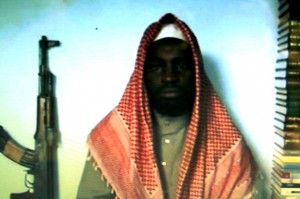There are indications that the Joint Task Force of the Nigerian Army operating in Borno State may have had the leader of the Boko Haram terrorist group, Sheikh Abubakar Shekau cornered in the Gwoza Hills area of the state.
This was disclosed by a top security force who told this correspondent that the JTF had located the area where the highly-wanted terrorism leader was hiding.
The source stated, “We are combing Gwoza hills where we believe Shekau is hiding.”
The source added that a unit of the Army’s Special Forces team had launched a “well-coordinated assault” on a group of insurgents somewhere in the Gwoza hills areas on June 26, 2013, where Shekau and some of his closest aides and members of his Shura Council were hiding.
He added that the operation ran into “hitches” and in the ensuing gun battle some of the insurgents and members of the Special Forces group lost their lives.
This was confirmed by another military source who said that one of the country’s best Special Forces officer, Major A.T. Fambiya, who had volunteered to lead the operation was killed in the operation.
Four other soldiers were gunned down by the insurgents during the encounter.
Fambiya, who hailed from Gwoza Local Government Area of Borno State, had reportedly volunteered for the mission because of his excellent knowledge of the area as he had grown up in the area and understood its rocky terrain.
Fambiya, who was on posting to the 322 Artillery Regiment in Benin City, Edo State, was redeployed to the JTF on June 13, 2013, a few weeks into his deployment to the JTF’s Operation Boyona.
A brief biography of the late soldier presented by the Nigerian Army authorities during his burial at the Nigerian Military Cemetery, Abuja on Thursday stated that he “was killed in action on 26 June in a fierce encounter with Boko Haram terrorists.”
However, Major Fambiya’s next-of-kin, Pastor Iliya Joshua was not satisfied with the said cause of the soldier’s death and called on the Federal Government to investigate the cause of the death of his brother.
“We call on the Federal Government to investigate the rumoured cause of the death of the officers since it remains a mystery to our family,” he said, without giving any explanation about what he meant by “rumoured death”.
Iliya later told our correspondent that he made the call to the Federal Government and the military authorities to investigate the deaths because his brother was not supposed to be in Borno.
He said that the late major was supposed to be undergoing training at the Nigerian Army School of Artillery, Kantagora, Niger State.
He said, “I made the call because he was supposed to be at the Army school of artillery. The last time I called him, he said that he was not part of those people that were going to Maiduguri for this operation.
“But later, I was told that he had been killed. He was not supposed to be on posting to that place.”
When our correspondent contacted the Director of Defence Information, Brig. Gen Chris Olukolade, he said that the mandate of the JTF was to look for all insurgents and not just the leader of the Boko Haram sect.
“We know that we are combing everywhere for every insurgent. The pursuit of the insurgents is continuing. That is the mandate at the moment,” he said.
President Goodluck Jonathan had told the CNN a few days ago that the Boko Haram threat would be overcome by security operatives in the country.
He said that the Federal Government was neither negotiating nor begging the Islamic militants as steps were being taken to deal decisively with the scourge.
He had said, “We are not negotiating with Boko Haram. It is done all over the world. It is not negotiation. We are not begging.
“Our security architecture was first designed to deal with ordinary criminals but since terror started, we have been building it. I believe if you are to interview me again in three months’ time, you will praise me that this government has tried.
“We are tackling terror from various angles. We must first of all stop them through military intervention, which we have initiated by declaring a state of emergency in three states where these terror attacks are predominant.”

